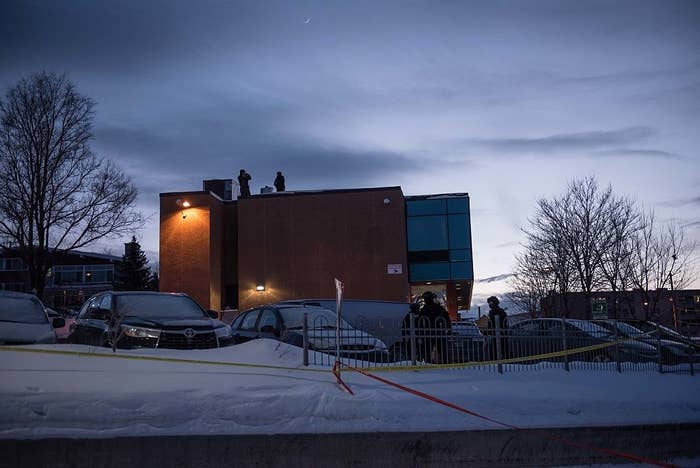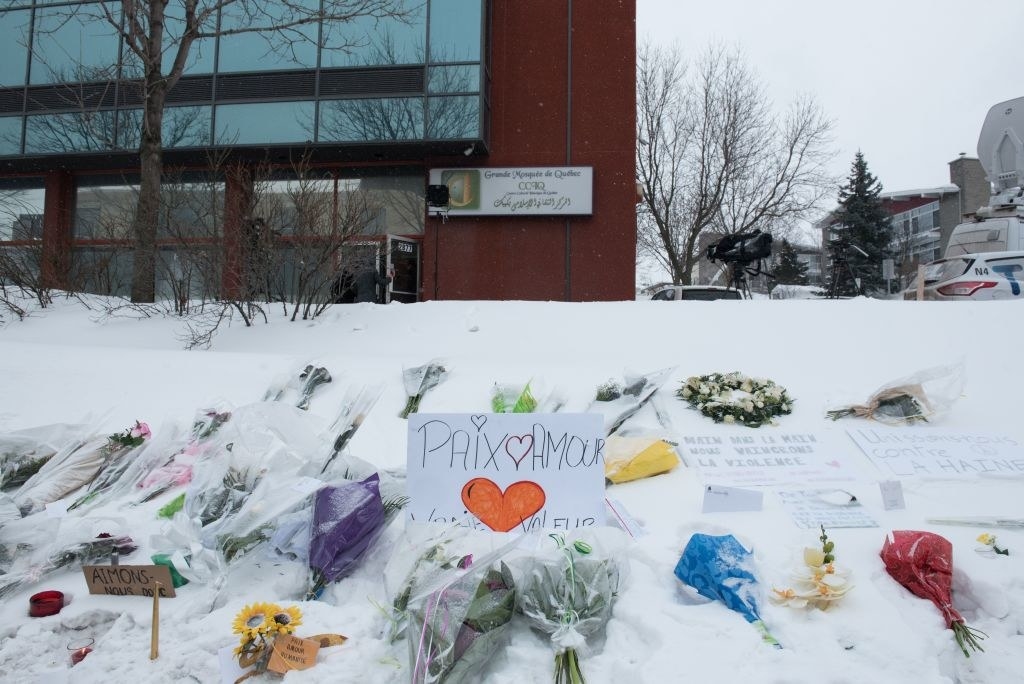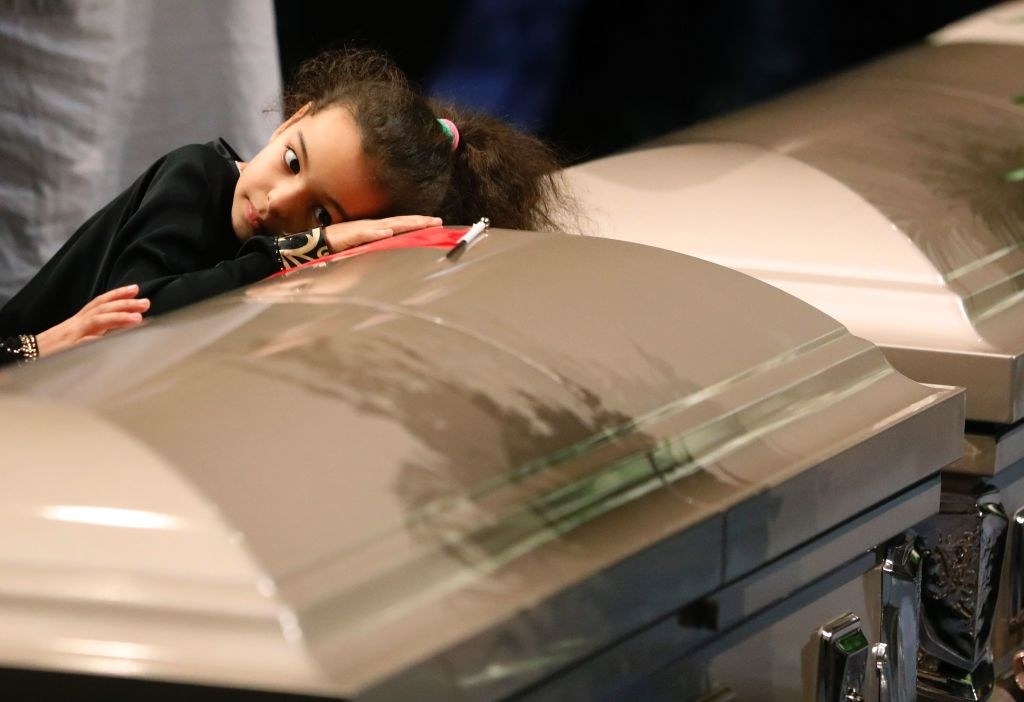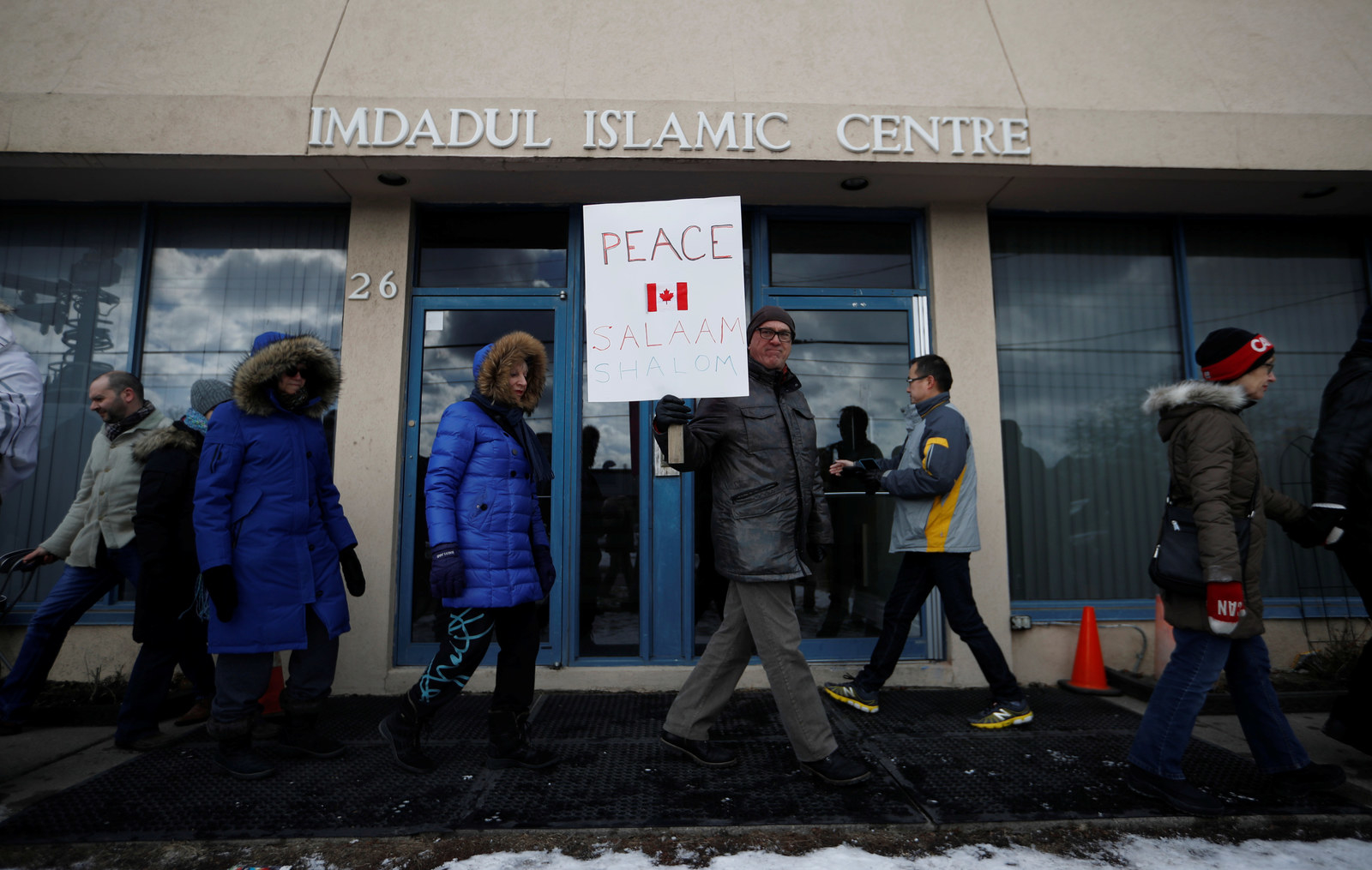
My 11-year-old daughter was the first one in our family to hear that something had gone terribly wrong at a mosque somewhere in Quebec — that people had been killed or injured. She didn’t tell us right away, not fully understanding what her friend had just texted her.
As she was upstairs processing the news, my husband was on Facebook and called out to me. “There are reports of a shooter,” he said. We scrolled down our feeds, visiting the pages of friends who live in Quebec for any information. My heart was racing, bracing for what this could mean for our communities.
The rest of that night was a blur, as the trickle of reports began to emerge that people had indeed been killed. I gave my first media interview that night at around 11:30 p.m. with a Quebec-based radio station. “It’s horrible to imagine,” I told the interviewer.

In the next 24 hours, we would learn that six men had lost their lives that night, shot dead by a man who was consumed by his hatred of Muslims. It’s often described as the “mosque massacre,” which sounds strange to me. It sounds like the title of a horror film, or a poorly written crime novel.
It doesn’t sound like a true story. It doesn’t sound real. But it is.
Months later, I would enter through the same doors at the Islamic Cultural Centre of Quebec City, the shooter had entered that night on a visit to the city. Community members pointing out to me where bullet holes remain lodged in the wall by the prayer hall, pointing out where people had been hiding, where the victims fell.
It was otherwise a space like countless spaces across this country where Muslims gather daily to pray. It could have been any one of us, standing there, socializing after our evening prayers were complete, feeling the calm that prayer can bring. A calm that was callously, heartlessly shattered that night. It was a calm that I had long feared might one day be broken in this cold and calculated way.

For five years, I worked on the front lines of advocacy for my communities at Canada’s only national human rights organization defending and promoting the rights of Canadian Muslims. As a human rights officer, first, and later as its director of communications, I had a clear view of a landscape in which Muslims were still considered suspect, unadaptable to Western culture, dangerous.
In Quebec, that landscape is magnified. Debates about Muslims have been unrelenting. On the airwaves, in the newspapers, on television, Muslims have consistently been portrayed as a threat to the province’s values, to its secularism, to its very existence. They have to fully adapt, or else. Over and over again, they are held up as the “other.”
One of the young people living in Quebec City told me recently that he and his other Muslim friends do their best to hide their identities, so that they can simply fit in. No one wants to be different, he told me. “We all have to be the same.” Some of the women I know who live in Quebec courageously wear headscarves, despite various forms of harassment they will persistently face — sometimes asked outright to remove them. The recent law on face veils once again brought our communities into the spotlight, in a very negative way.
With all of this at play, it sadly shouldn’t have come as a surprise that it was the Quebec Muslim community that would be the target of the deadliest attack at a place of worship in our country’s history.
Even the province’s leader admitted as much. In the days following the attack, Quebec Premier Philippe Couillard said the atmosphere towards Muslims in his province was problematic, that the way people spoke about our communities was hurtful. “When I say that words matter, it means that words can be knives slashing at people’s consciousness,” he said, admitting that “every society has to live with its demons. Our society is not perfect. No society is.”
And while there was welcome reflection in the days immediately following the tragedy, nothing much changed.
On the contrary, the ongoing suspicion and blame that falls on our communities whenever a terrorist act happens somewhere in the world continues to fall on us. Whenever politicians want to pander to the views of those who dislike or fear Muslims — and many people do, according to all the latest polls — they do so without fear of the consequences. This is accentuated in Quebec for a simple reason — a fear of a loss of the majority’s own cultural norms and values.

Fear and hatred of our communities isn’t new. It’s what I, and many others in our communities, had been witnessing over the years. Even beyond Quebec, the West has long had an uncomfortable relationship with Muslims — especially after the terrorist attacks on 9/11. Muslims have long been seen through an orientalist lens, as many thinkers and academics have written.
Study after study has shown that Muslims are often portrayed negatively. One Canadian study of the New York Times found that Islam and Muslims were more negatively portrayed than even cocaine or cancer. Other studies have shown a disproportionate number of stories linking Islam and terrorism, while media focus less on incidents involving right-wing or white supremacist extremists. When politicians — including at one point Canada’s former prime minister — continuously link our communities to terrorism, it isn’t surprising that significant numbers of Canadians will consider Islam and Muslims “damaging” to our society, as found in a recent Angus Reid poll.
Our communities have pushed back — and keep pushing back — on narratives that attempt to frame us as violent extremist, monolithic mobs, determined to upend Western civilization and destroy democracy. But we’ve hardly succeeded in changing attitudes despite our frequent efforts to reach out beyond our communities, to open up our mosques and centres, to volunteer and participate in charitable causes in our neighbourhoods, to continue to contribute positively through our work and studies.
It hasn’t been enough. Maybe it will never be enough. Our communities seem to always be expected to defend ourselves, to answer for our beliefs, and for the way some of us practice our religion.
Nonetheless, we see Canadian Muslim men and women continue to succeed despite the various challenges we face — as cabinet ministers, as entrepreneurs and business owners; as doctors, engineers, and architects; as school board trustees, city councillors, teachers, journalists, and union leaders, and as so much more. We keep giving back.
But all of that gets overshadowed by the unrelenting negative focus on our communities, including the focus on what some women choose to wear. This past fall, the Quebec government attempted to stop women who wear a face veil from accessing public services. It was a reminder of the previous federal government’s efforts to stop a woman from taking her citizenship oath with a niqab, despite the fact that she showed her identity when it counted. Time and time again, Muslim women are held up as symbols of our faith’s purported oppression of women — even though these Canadian women themselves will affirm their full agency in making their own choices. And even though we have a Canadian Charter of Rights and Freedoms that is there to protect our right to live freely in this country.
And so, with an American Islamophobia industry funded in the millions of dollars, with international social media platforms full of lies and stereotypes and fake news about Muslims, and with some politicians all too happy to stoke fears and prejudice so that they can paint themselves as protectors of Western civilization, was it any surprise that a young, troubled man would take it upon himself to target our communities?

As this painful anniversary arrives, I want to say I’m hopeful. I want to say fellow Canadians understand now more than ever why we must fight Islamophobia and all forms of hate and bigotry that target any community. But I’m more afraid than hopeful.
I’m afraid that the minority of hateful voices will continue to find their audiences, will continue to grow their followings, will continue to rally the ignorant and bigoted. I’m afraid that leaders who care more about political victory than social cohesion will continue to divide us, rather than bring us together.
I’m afraid that our police services, our schools, our social services, our city councils and legislatures, are ill-equipped to deal with hate and prejudice. I’m worried that children will continue to read and say terrible things about their fellow classmates and neighbours.
To this day, I don’t know how my daughter actually felt when she heard the news. It’s been too painful to talk about. What I did try to do, with her as well as other young people I’ve since spoken with, is share the images and stories of thousands of fellow Canadians coming out to show their love, solidarity, and compassion in the days following the tragedy.
Those are the images that have kept many of us going. Because what choice do we have but continue to fight for a better world for our youth, including the children of those who were killed that night. We owe it to the families of Ibrahima Barry, Mamadou Tanou Barry, Khaled Belkacemi, Aboubaker Thabti, Abdelkrim Hassane and Azzedine Soufiane to try. We owe it to ourselves. ●
